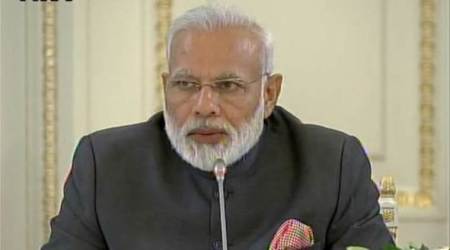 Indian Prime Minister Narendra Modi and Russian President Vladimir Putin (R) shake hands after making a statement on the sidelines of the St. Petersburg International Economic Forum (SPIEF), Russia, June 1, 2017. (REUTERS/Grigory Dukor)
Indian Prime Minister Narendra Modi and Russian President Vladimir Putin (R) shake hands after making a statement on the sidelines of the St. Petersburg International Economic Forum (SPIEF), Russia, June 1, 2017. (REUTERS/Grigory Dukor)
Prime Minister Narendra Modi travelled to Russia’s most interesting city, St. Petersburg, today to meet Russian president Vladimir Putin, to mark 70 years of the establishment of diplomatic relations between the former Soviet Union and India – remarkably, both countries did this even before India became independent two months later in 1947 – and participate in the St Petersburg International Economic Forum (SPIEF) on June 2, where India and Serbia are the guest countries this year.
The PM’s Twitter team put out four tweets on, including two in Russian, on his meeting with Putin as well as his visit to the historic Piskarovskoye cemetery, a St. Petersburg landmark – or Leningrad as it was known during the Second World War, when more than a million men, women and children died in the Siege that lasted 900 days.
Paid homage at the Piskarovskoye Cemetery. pic.twitter.com/om9HUo72YA
— Narendra Modi (@narendramodi) June 1, 2017
Check out Modi laying a wreath at the cemetery at @narendramodi.in, with an enormous sculpture of Mother Russia towering above him. She holds a string of bronze flowers in her hands as she looks down eternally at the hundreds of graves that bear witness to that terrible and heroic time.
Certainly, no one who goes there can be failed to be moved by the immense sense of loss and grief that permeates the place.
The Siege of Leningrad is forever marked in the collective subconscious of all Russians – especially St.Petersburgers like Putin, who lost a brother to extreme malnourishment, starvation and ultimately diptheria. In a 2008 piece that he wrote for “Russky Pioneer” magazine, Putin spoke feelingly about the trauma he grew up with from all those stories he heard from his parents.
The PM probably heard some of that too from his own Russia experts in the ministry of external affairs, which probably explains why he referred to it in his conversations with the Russian president.
“I visited the Piskarovskoye cemetery today,” Modi told Putin, “you are the leader of a country that has made great sacrifices…you even lost your brother in those terrible times,” Modi added.
Certainly, it is moments like these which transcend the somewhat ungainly present and reinvent the histories, and through them the close relationship, between two very disparate countries – this is actually the stuff of strategic partnerships.
Of course, it doesn’t take long for the sublime to be marked by the ever-present rigours of the present. Journalists have to earn their bread and butter too. So at a press interaction in the Konstantin Palace – a summer home of Peter the Great, which overlooks the Gulf of Finland – a variety of editors asked Putin about Kashmir, why Russia was making such good friends with Pakistan and what was so great about the India-Russia relationship anyway?
Putin lived up to his reputation – he was direct and forthright. “We do not have any close relations with Pakistan,” he said, speaking through an interpreter, referring to the military exercises both nations conducted some months ago, adding, “Do you (India) have close relations with the US?”
Asked whether Pakistan was fuelling terrorism in Jammu & Kashmir, Putin is believed to have side-stepped the question, only saying somewhat enigmatically, “it is up to you.” Or at least, that is what PTI reported.
Intensifying the Spl &Privileged Strategic Partner’p. PM @narendramodi & President Putin met for the 18th Annual Summit at Konstantin Palace pic.twitter.com/4UScVw7FAj
— Gopal Baglay (@MEAIndia) June 1, 2017
Spokesperson Gopal Baglay @MEAIndia put out a photo of Modi and Putin hugging each other. The Twitter handle of the Russian president @KremlinRussia_E was more circumspect, its own photo showing the two shaking hands. Yes, its true that the Russian leader doesn’t smile as much.
#Петербург: Встреча с Премьер-министром Индии Нарендрой Моди http://t.co/Al467QUe5K pic.twitter.com/UFrEuI0eTk
— Президент России (@KremlinRussia) June 1, 2017
Putin was certainly welcoming. “ Mr Prime Minister, friends. It is a pleasure to welcome you to Russia, this time to St Petersburg. I am happy that we are meeting in this city. As far as I know, you have not been to St Petersburg before. I hope you will have time to tour the city and its landmarks, including the Hermitage and the collection of oriental manuscripts at the Russian Academy of Sciences,” he said.
Both leaders are bound to sort out their bilateral issues – including the building of several Russian nuclear power plants in Kudankulam, Tamil Nadu, the abysmal lack of trade and economic interaction as well as the perception of frostiness that emerged when Putin came to Goa last year and refused to sign on to an Indian statement that sought to castigate Pakistan for terrorism.
But the truth is that the world is a much bigger place. Putin chastised journalists for pursuing a zero-sum approach to diplomacy when he said, “just because Russia has a special relationship with India,” does that mean India cannot have special relations with other countries? “This is ridiculous,” he added.
That is why the shadow of China overhangs every meeting. In fact, both Putin and Modi will meet in Astana, Kazakhstan, a week from now at the summit of the Shanghai Cooperation Organisation, a China-led organisation in which India and Pakistan are finally becoming full-fledged members. Naturally, Xi Jinping will be there too.
As for SPIEF, if you didn’t know where to look, it would be difficult to locate India’s guest country status (http://forumspb.com/en/2017/sections/68/materials/353). Still, there will be special sessions on the states of Assam, Jharkhand, Karnataka and, inevitably, Gujarat – although who picks these things is an abiding mystery.
